Air Combat Command Welcomes First EA-37B Compass Call
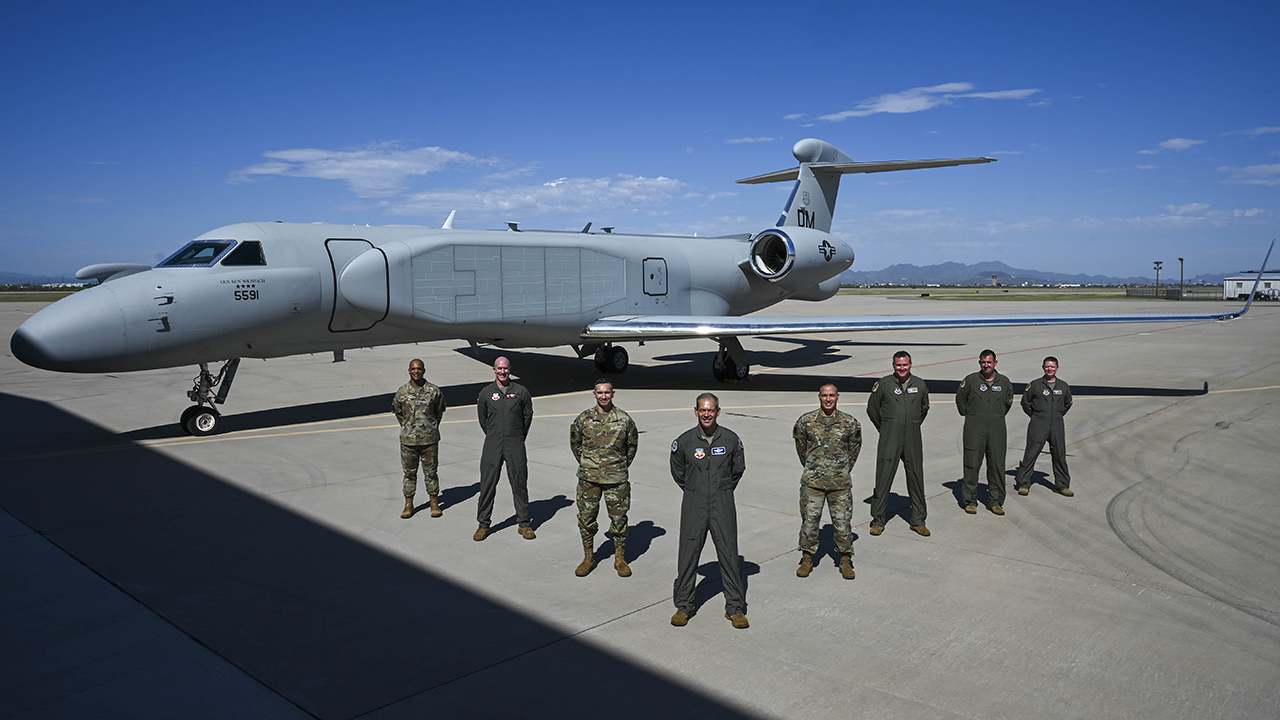
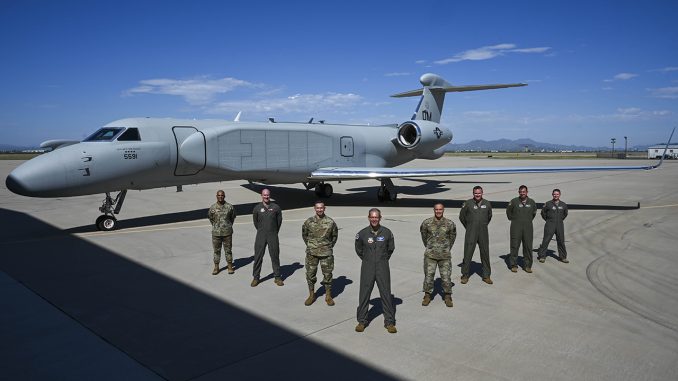
New Era of Electronic Combat Begins with the Arrival of the first EA-37B at Davis-Monthan AFB.
On Aug. 23, 2024, Air Combat Command received its first EA-37B Compass Call. The aircraft, serial 19-5591, will be used for pilot training at Davis-Monthan Air Force Base, Arizona.
The EA-37B, a cutting-edge airborne electromagnetic attack system based on the modified Gulfstream G550 airframe, was officially delivered during a ceremony attended by by Gen. Ken Wilsbach, commander of Air Combat Command, alongside Lt. Gen. Thomas Hensley, commander of the 16th Air Force, and Col. Mark Howard, commander of the 55th Wing.
“There’s nothing more thrilling for a pilot than delivering a brand-new aircraft directly from the factory to the warfighters. For those who will fly it, the experience will be incredible,” Wilsbach stated in a publis statement. “We are on the brink of introducing advanced capabilities, especially in electronic combat, making today a landmark moment for Air Combat Command.”
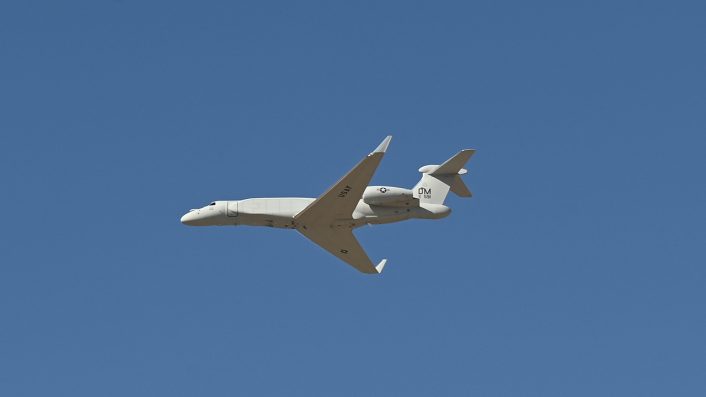
Assigned to the 55th Electronic Combat Group, the aircraft will be operated by the 43rd Electronic Combat Squadron and maintained by the Contractor Logistics Support Aircraft Maintenance team at Davis-Monthan AFB. This marks the first opportunity for ACC aircrews to begin mission planning and training with the new aircraft.
Although based at Davis-Monthan AFB, the 55th ECG reports to the 55th Wing at Offutt AFB, Nebraska. The group is the sole operator of Compass Call aircraft in global contingency missions.
Ten EA-37Bs will replace the 14 EC-130H operated by the 55th Electronic Combat Group (ECG) at Davis-Monthan AFB, of which nine have already been divested and stored at the 309th Aerospace Maintenance and Regeneration Group.
The EC-130H flew for the first time in 1981 and was delivered to the Air Force a year later. The aircraft, with a crew of 13 people (four responsible for flight and navigation and nine for the EA mission equipment), has been upgraded throughout the years, but after 40 years it needs a replacement. Following the type’s retirement announced in 2014, the U.S. Air Force initiated the Compass Call Rehost program, which is moving the Compass Call suite from the EC-130H to the new EC-37B.
“The EC-130 served us well for many years, but this new airframe represents a combat-ready threat,” Howard remarked. “With its enhanced range, speed, and agility, the EA-37B enables Airmen onboard to make real-time, adaptive decisions to bolster airpower.”
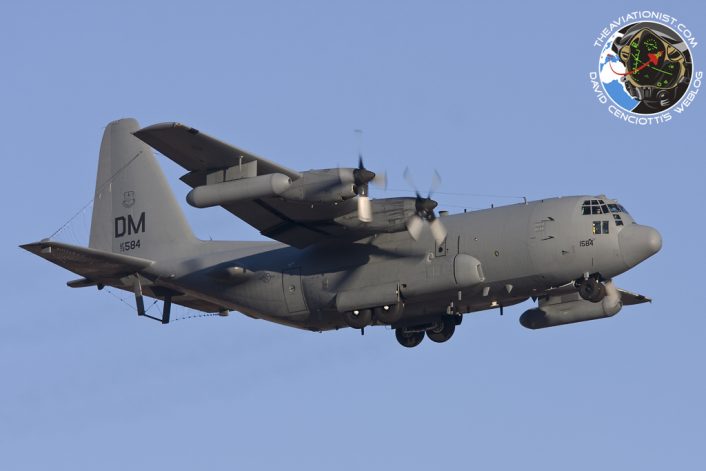
The role of the Compass Call is to disrupt enemy command and control communications, radars, and navigation systems, significantly hindering adversary coordination as part of the Counter-Command, Control, Computers, Communications, Cyber, Intelligence, Surveillance, and Reconnaissance Targeting (Counter-C5ISRT) mission. This disruption of enemy battlespace management and suppression of air defenses is crucial in modern operations to increase mission success rates.
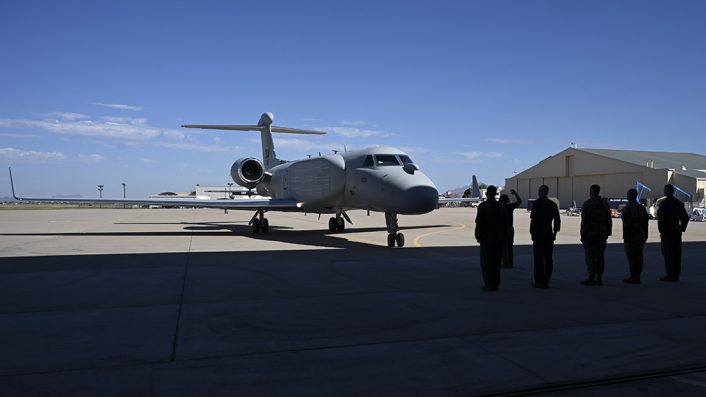
As the Department of Defense’s only long-range, full-spectrum stand-off electromagnetic warfare jamming platform, the Compass Call plays a key role in the US Suppression of Enemy Air Defense (SEAD) strategy, alongside the EA-18G Growler and the F-16CM Block 50/52 Fighting Falcon. Future upgrades will boost counter-C5ISRT capabilities, incorporating software-defined radios and an open architecture to quickly adapt to emerging threats.
“As we shift our focus towards Great Power Competition, with adversaries developing sophisticated anti-access and area-denial capabilities, the EA-37B is the right tool at the right time,” Hensley explained. “Compass Call offers us a significant advantage in both the non-kinetic and electromagnetic spectrums.”
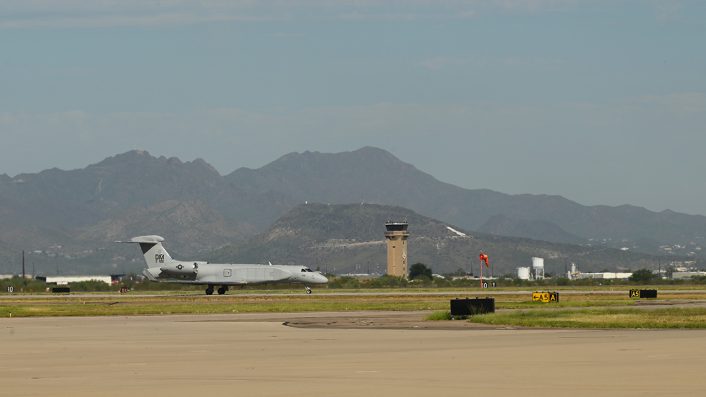
“The EC-130 has been a cornerstone at Davis-Monthan since the early 1980s. The arrival of the EA-37B, along with the establishment of the 11th Air Task Force, marks a new chapter for the base,” said Col. Scott Mills, commander of the 355th Wing. “As the threat landscape evolves, the Airmen of Davis-Monthan and the 55th Electronic Combat Group stand ready to meet it head-on.”
The upgrade of the Compass Call mission system includes several incremental advancements, notably BAE Systems’ Small Adaptive Bank of Electronic Resources (SABER) technology. SABER represents a significant technological leap, enabling the transition of the Compass Call weapon system from a hardware-based platform to a software-driven electromagnetic spectrum (EMS) warfare capability. Built around a suite of Software Defined Radios (SDRs) utilizing an open system architecture, the SABER system will form the core of the new EC-37B’s operating system, referred to as the “Baseline 4” iteration.
The transition of the Compass Call mission to the new asset will also introduce significant savings: the operating costs of the EC-37B will be reduced by half compared to the EC-130H Compass Call. This aircraft will also be capable of executing its missions at higher altitudes, greater speeds, and extended ranges and durations. Additionally, the G550-based platform will be optimized for operations in Anti-Access, Area-Denial (A2/AD) environments and can be easily upgraded to counter emerging threats, thanks to its Modular Open Systems Architecture.
Moreover, the Compass Call’s electronics and software may incorporate even more advanced capabilities in the future. Chris O’Donnell, Deputy Assistant Secretary of Defense for Platform and Weapon Portfolio Management, highlighted in 2022 the need for targeted investments and innovative technologies, such as cognitive electronic warfare (EW), to maintain superiority over adversaries and address both traditional and unconventional threats. In fact, cognitive EW capabilities are already being tested with the Angry Kitten ECM pod, making it highly likely that such technologies could eventually be integrated into the EC-37B.
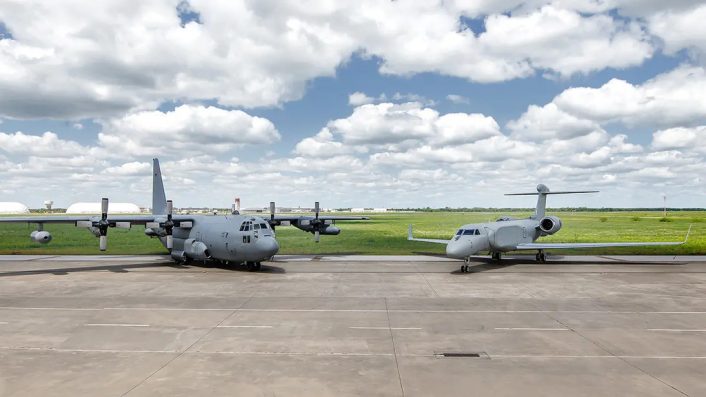
During the delivery ceremony of the first aircraft, Gen. Ken Wilsbach expressed his gratitude to the Tucson community for their steadfast support of Davis-Monthan AFB and its mission.
“This community’s support is invaluable to our mission here at Davis-Monthan, and I couldn’t let this ceremony pass without expressing our gratitude,” Wilsbach said. “You make a difference for the Airmen and their families, and you enable us to maintain readiness, train effectively, and be prepared for any challenge.”
A second EA-37B aircraft is expected to arrive at Davis-Monthan AFB for training by the end of 2024.
